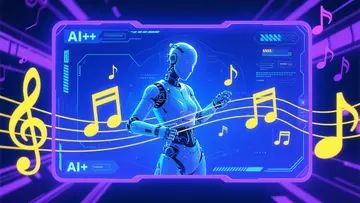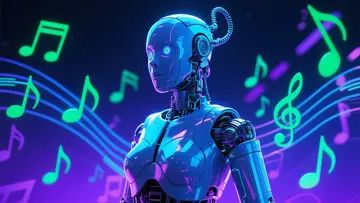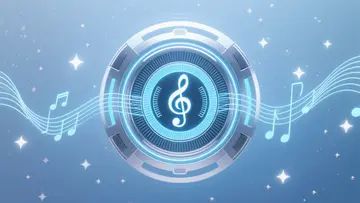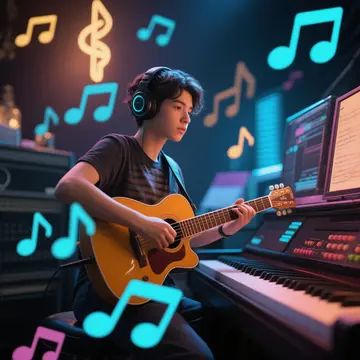Can AI Music Artists Really Sign with Record Labels?
In 2025, as AI-generated music gains momentum, a growing number of virtual performers—some fully algorithmic, others guided by humans—are entering mainstream platforms. With viral hits created by tools like Suno, Udio, Boomy, and even AIVA, the line between artist and algorithm continues to blur.
That raises an important question: Can an AI music artist sign with a record label?
The short answer? Yes—but not in the traditional sense.
AI cannot legally sign contracts, own copyrights, or receive royalties directly. However, the people and companies behind these AI projects can—and increasingly do—sign real deals with real labels.
This article explores exactly how AI music artists are getting signed, what rights are involved, who owns the music, and what artists and entrepreneurs need to know before taking the plunge.

What Is an AI Music Artist?
An AI music artist is a virtual or synthetic persona whose songs are generated (fully or partially) using artificial intelligence. These artists might be:
Autonomously generated music personas via tools like Boomy or Soundful
Human-guided AI singers with digital avatars, like Noonoouri or FN Meka
Voice models combined with generative lyrics and compositions (e.g., via Suno or Udio)
Though they may not physically exist, they still produce, release, and promote tracks—often through Spotify, YouTube Music, Apple Music, and TikTok.
Who Can Sign a Deal for an AI Music Artist?
AI models can't sign contracts, but humans can. The legal signing party is always a person or organization that:
Initiated the AI creation process
Owns the copyright (if applicable)
Controls the branding, identity, and management of the AI artist
Is responsible for licensing and monetization
In practice, this could be:
An independent musician who uses Boomy or Udio to generate tracks
A startup or creative agency developing a virtual idol project
A record label’s in-house AI lab launching digital-only acts
?? Important: The clearer your ownership of the AI content and IP, the more likely a label will be interested in a deal.
Real Case Studies: AI Artists That Signed with Record Labels
Noonoouri (Signed with Warner Music, 2023)
A fully digital fashion and music persona
Created by Opium Effect (a German creative agency)
Released debut single "Dominoes" with vocals generated by AI
Managed by a real team, licensed through Warner Music Germany
This groundbreaking signing proved that AI music artists can enter major label rosters, as long as legal and creative frameworks are in place.
FN Meka (Briefly Signed to Capitol Records, 2022)
AI-powered rapper with human-written lyrics and AI-assisted voice
Faced backlash due to cultural appropriation concerns
Dropped by Capitol within weeks, highlighting the importance of ethics and transparency
How AI Music Artists Get Signed: Step-by-Step Process
1. Develop the AI Artist Brand
Even if your project uses AI to generate songs, it still needs:
A unique visual identity (avatar, aesthetic, mood board)
A defined musical style or genre niche
Content strategy across TikTok, Instagram, YouTube, and Spotify
You need to build a believable narrative around the AI persona—who they are, what they stand for, and why listeners should care.
2. Clarify Copyright and Licensing Rights
Before approaching any label, make sure:
You own the outputs of your AI tools (check Udio, Suno, Boomy terms)
Any vocals or instrumentals used are original or properly licensed
You can commercially distribute the songs (some platforms require Pro plans)
Boomy, for example, allows monetization through Spotify and YouTube, but takes a revenue share for free-tier users. With paid tiers, artists can claim full rights.
3. Register a Legal Entity or Artist Representation
Labels don’t sign with fictional characters—they sign with legal entities. You’ll need to either:
Register as a business or LLC managing the AI music brand
Work with a music manager or talent rep
Use distribution platforms like Symphonic, DistroKid, or Amuse that also offer label services and connections
4. Pitch to Record Labels or Aggregators
To catch the attention of labels, prepare a compelling pitch deck that includes:
Your AI artist’s story, design, and voice samples
Track record of viral moments, streams, or audience growth
A list of platforms/tools used to produce and manage the artist
Copyright clarity and commercial licensing proofs
Target both independent digital-first labels (like Create Music Group or Nvak Collective) and major labels’ innovation divisions (e.g., Warner’s AI initiative, Universal’s collaborations with Google DeepMind).
Why Labels Want to Sign AI Artists
Low cost, high output: No studio time or tour expenses
Viral potential: AI personas can be optimized for TikTok or Instagram
Full control: The brand can be adjusted, rebranded, or multilingually adapted
24/7 productivity: AI doesn’t sleep—new songs can drop weekly
With the right team and platform, AI artists can outperform human ones in certain business metrics.
Legal Grey Areas to Watch Out For
Copyright ownership: Purely AI-generated works may not qualify for copyright under U.S. law unless there’s clear human contribution
Voice cloning: Mimicking famous voices (e.g., Drake, Ariana Grande) without consent can lead to takedowns or lawsuits
Public backlash: The FN Meka case shows that poor handling of AI identity and ethics can lead to canceled deals
Frequently Asked Questions
Q1: Can AI artists go on tour?
Yes—via virtual concerts, holograms, or VR shows. Examples include Hatsune Miku and Travis Scott’s Fortnite performance.
Q2: What music distributors work with AI creators?
Boomy (built-in publishing)
Amuse
DistroKid
Symphonic
All allow AI music as long as rights are cleared.
Q3: Can AI artists be verified on Spotify or TikTok?
Yes, if their branding is consistent and audience engagement is high.
Q4: How much do labels typically offer for AI acts?
Deals vary but include advances ($5K–$100K+), royalty splits (50/50 or better for popular acts), and full marketing support.
Q5: Can I create an AI music artist from scratch today?
Absolutely. Tools like Suno, Udio, Voicify, Synthesizer V, and D-ID offer voice, image, and even video generation for virtual musicians.
Conclusion: AI Artists Can Sign Record Deals—If the People Behind Them Are Ready
AI music artists may not be legally human, but their impact is real. Record labels are already signing deals with the creators, managers, and teams behind these digital performers.
To succeed in this space, you need:
Strong creative direction
Legal clarity around ownership and licensing
A consistent marketing and distribution strategy
With the right foundation, AI artists are no longer a novelty—they’re a serious force in music.
Learn more about AI MUSIC



